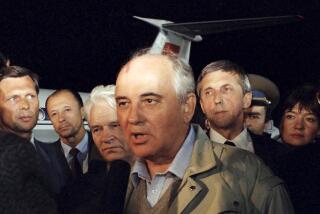Soviets OK Super Presidency : Sweeping Victory for Gorbachev
- Share via
MOSCOW — Mikhail S. Gorbachev won a decisive victory today when the Soviet parliament approved his plans to create a powerful executive presidency and also to end the Communist Party’s 72-year monopoly on power.
The opposition had predicted a very close vote but the Congress passed the presidential measure by a vote of 1,817 to 133, with 61 abstentions. A two-thirds majority of the 2,250-member Congress of People’s Deputies was required for the motion to pass.
The presidency bill creates a chief executive who can propose legislation, veto laws passed by the Supreme Soviet legislature, declare war or martial law and overrule Cabinet members. Vice President Anatoly Lukyanov said it also clearly separates executive and legislative powers for the first time.
The parliament routed opponents of the new presidency, who feared that it might lead to the re-establishment of a Stalin-like dictatorship.
“We are standing before the greatest, most meaningful step in the history of our government,” Gorbachev told the parliament.
“This is the first step toward a Western political system,” Deputy Fyodor Burlatsky said.
Later today, the deputies were expected to nominate Gorbachev to a four-year term as president, then decide whether the Congress or the public would elect the new president.
It is expected that after the initial four years, the term will become five years and the president would be popularly elected.
Gorbachev has argued that the more powerful presidency is needed to keep the Soviet Union intact as he presses ahead with his reforms while facing a crumbling economy and growing independence movements.
Lithuanians had been so dismayed by the proposal on the more powerful presidency that they rushed to declare independence before it passed on Sunday. Estonia, Latvia and Georgia have all taken moves in that direction.
To succeed today, Gorbachev backed off some demands that had disturbed legislators from some republics, who believed that he would have too much power. Those demands included the president’s right to declare on his own a state of emergency and to suspend the parliaments of the republics.
Lukyanov said the bill allows Congress to recall the president for breaking the law and restricts the passage of legislation to the Congress and the Supreme Soviet, the standing legislature.
The vote on scrapping the party’s leading role passed in the Congress by a vote of 1,771 to 164, with 74 abstentions.
The historic change in Article 6 of the Soviet Constitution drops language defining the Communist Party as the “leading and guiding force of Soviet society and the nucleus of its political system, of all state organizations and public organizations.”
The new article reads, “The Communist Party of the Soviet Union, other party, trade union and youth organizations, other social organizations and mass movements, shall participate, through their representatives elected to the Soviets of People’s Deputies as well as in other ways, in shaping the policies of the Soviet state and in running the state and social affairs.”
More to Read
Sign up for Essential California
The most important California stories and recommendations in your inbox every morning.
You may occasionally receive promotional content from the Los Angeles Times.












